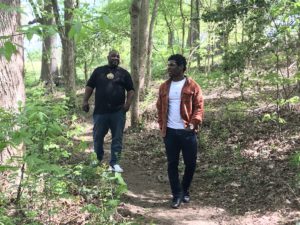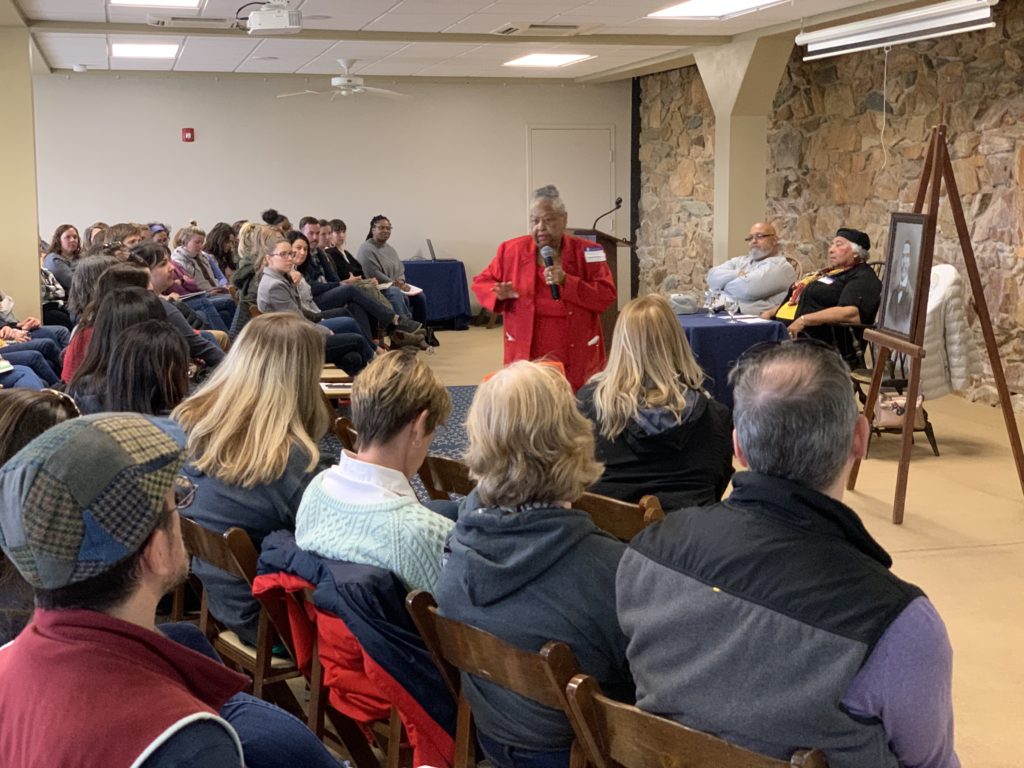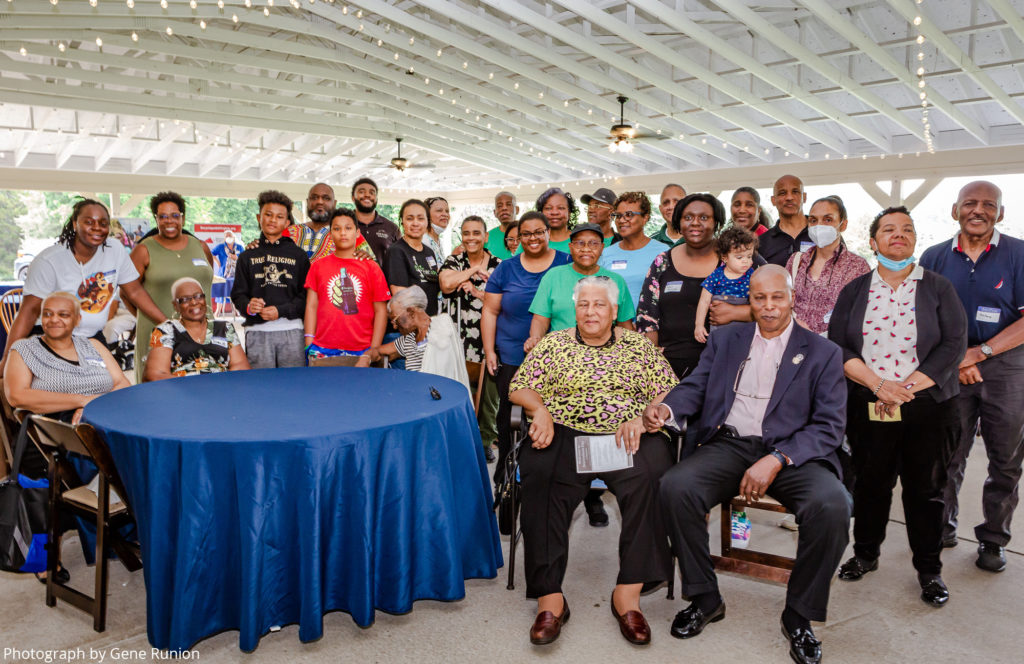
The Highland Council of Descendant Advisors is a group of individuals whose African American ancestors were enslaved at Highland or worked on the property after the Civil War. Council members provide input on the interpretive content and direction of James Monroe’s Highland. The Council participates in creating a vision for Highland’s research, teaching, public interpretation, and community activities.
Highland recently created new site interpretation in 3,000 square feet of exhibition space. Members of the Council reviewed and provided input on every stage of this multi-year process. We characterize Council input as contributing to the content, theme, and tone of the exhibitions. This means that the public interpretation reflects the Council’s voice in its topics, recurring threads of discussion, and the selection of a particular approach for impact.
In addition, Highland staff collaborate with the Council to develop and carry out initiatives generated by Council members. These initiatives include the Highland Descendants Day, which has been held in June each year starting in 2022. They also include a trip to Florida to meet and fellowship with descendants of enslaved people sold by Monroe to Casa Bianca Plantation in 1828.
Shared Authority
Museum professionals often come from outside the communities most affected by the histories they teach. To counteract the perspective created by this tendency, a group of ten descendants of men, women, and children enslaved at Highland are engaged in an initiative of “shared authority” of interpreting the site’s history. The project is based on the idea that the descendants whose ancestors were enslaved, and whose family histories bear the injustices of race in our country, have an important voice in determining what stories are shared at Highland, and how those stories are told. Our collaboration makes the stories more relevant to our community and more truthful. A grant to William & Mary from the Andrew W. Mellon Foundation supported this work and its connection with student learning on campus from 2019-2024.
Shared Authority
Shared authority is built on the acknowledgment that members of community groups are essential keepers of relevant knowledge and experience. Shared authority promotes structures and processes that not only incorporate but also privilege the expertise of community members through sustained partnerships. Shared authority is an evolving practice in public humanities where community collaborators have input into and control of key decisions, and museum, research, or education professionals are not the sole directors of the process or content. Scholars point to Michael Frisch’s (1990) volume as the origin of the concept. In the context of historic places, especially former plantations, the concept has been in use recently to refer to the ethical practice of centering the voices of descendant communities in matters of research, interpretive content including theme and tone, and governance. The core element is an acknowledgment that public humanities professionals, often white and from outside the community most impacted by the history being interpreted, have less appropriate authority for interpreting the past than descendants, whose communities, ancestral and present-day, have been more greatly impacted by the history being addressed. In embracing the concept of shared authority, public humanities professionals may contribute expertise while key decisions on process and content are made and carried out jointly, with valued advice from community members who have the power to direct initiatives in collaborative settings.
Reference Frisch, M. (1990) A Shared Authority: Essays on the Craft and Meaning of Oral and Public History. Albany, NY: State University of New York Press.
Mariaelena DiBenigno and Sara Bon-Harper, glossary entry in Daniel Fisher-Livne, and Michelle May-Curry. The Routledge Companion to Public Humanities Scholarship. Routledge, 2024 (p. 418).
Mission
The Highland Council of Descendant Advisors is a group of individuals with connections to Highland through their Black American ancestors who were enslaved on the property, or who worked there after the Civil War. The group exercises shared authority for Highland’s historic content and strategic direction and works with the Highland team to develop and deliver initiatives generated by the Council.
Vision
The Highland Council of Descendant Advisors and Highland share a commitment to discovering and sharing better history for the community, the general public, and William & Mary. The Council pursues research that adds to our understanding of Black American history at and around Highland and the families that descend from historic workers. The Council fosters healing through authentic engagement with Highland’s past and present, and the development of community initiatives that serve the populations harmed by historic slavery at Highland and in Albemarle County and Charlottesville. The Council strives to be a leader in the practice of descendant collaboration and find ways to support other groups and individuals walking the same path to truthful history and community healing.
 Descendant advisors have spoken publicly about the work, have engaged in conversation across the William & Mary campus, with students and administrators, and have led workshops for Charlottesville City Schools teachers and staff on Difficult History.
Descendant advisors have spoken publicly about the work, have engaged in conversation across the William & Mary campus, with students and administrators, and have led workshops for Charlottesville City Schools teachers and staff on Difficult History.
Our direction is shaped by the National Summit on Teaching Slavery, where some of the group participated and helped with the follow-on work of creating a rubric for descendant engagement: https://montpelierdescendants.org/wp-content/uploads/2024/07/Interpreting-Slavery-10_19_18.pdf. We strive to follow the rubric toward best practices.
Most importantly, we strive to learn from one another, and we value the richness of experience in our intentional conversations.
 The Council welcomed several local and regional descendant communities during its first annual Descendants Day at Highland in June 2022. The gathering ended with a photo of all the groups together.
The Council welcomed several local and regional descendant communities during its first annual Descendants Day at Highland in June 2022. The gathering ended with a photo of all the groups together.
Discover more about the Council’s work:

 Descendant advisors have spoken publicly about the work, have engaged in conversation across the William & Mary campus, with students and administrators, and have led workshops for Charlottesville City Schools teachers and staff on Difficult History.
Descendant advisors have spoken publicly about the work, have engaged in conversation across the William & Mary campus, with students and administrators, and have led workshops for Charlottesville City Schools teachers and staff on Difficult History. The Council welcomed several local and regional descendant communities during its first annual Descendants Day at Highland in June 2022. The gathering ended with a photo of all the groups together.
The Council welcomed several local and regional descendant communities during its first annual Descendants Day at Highland in June 2022. The gathering ended with a photo of all the groups together.